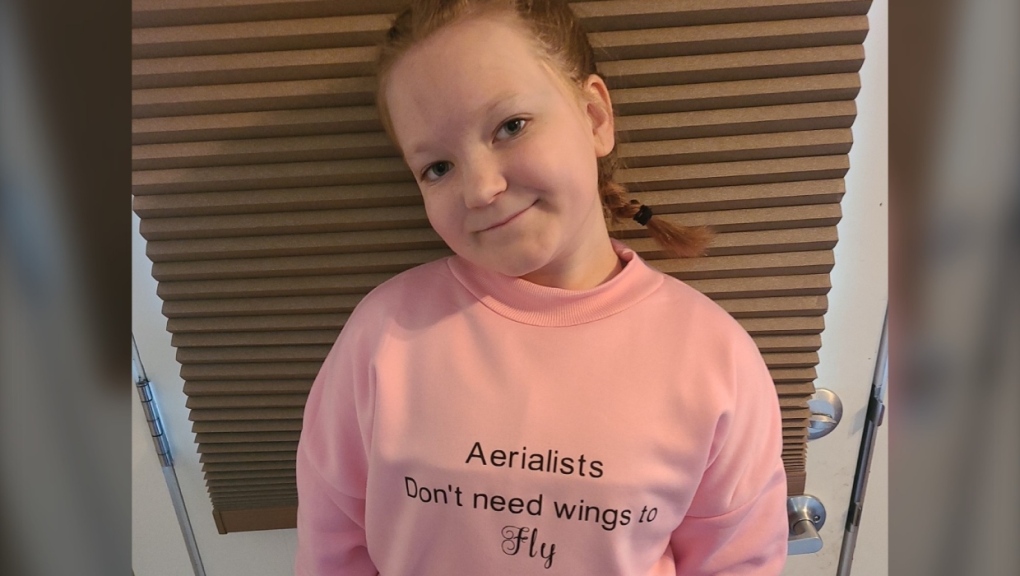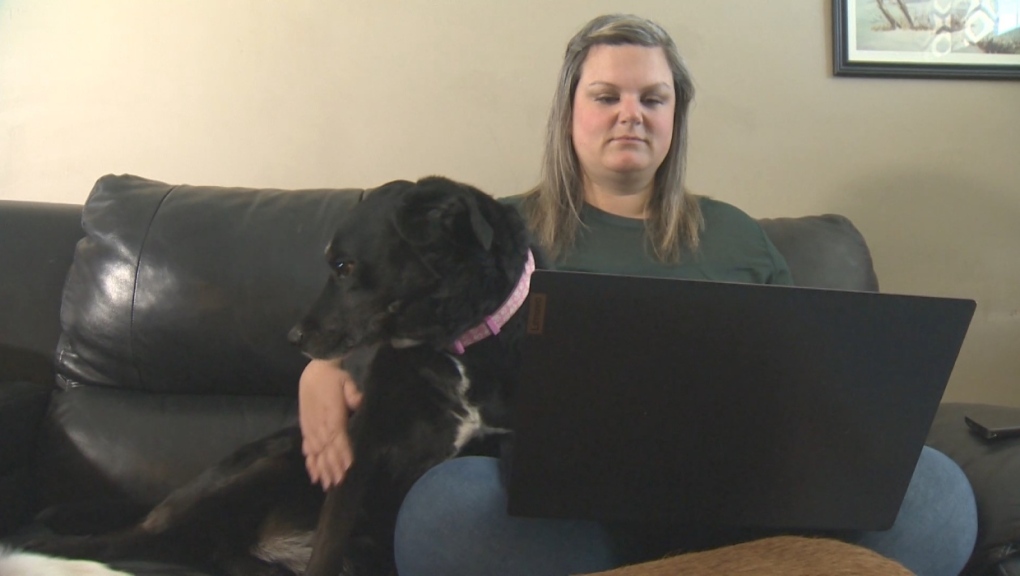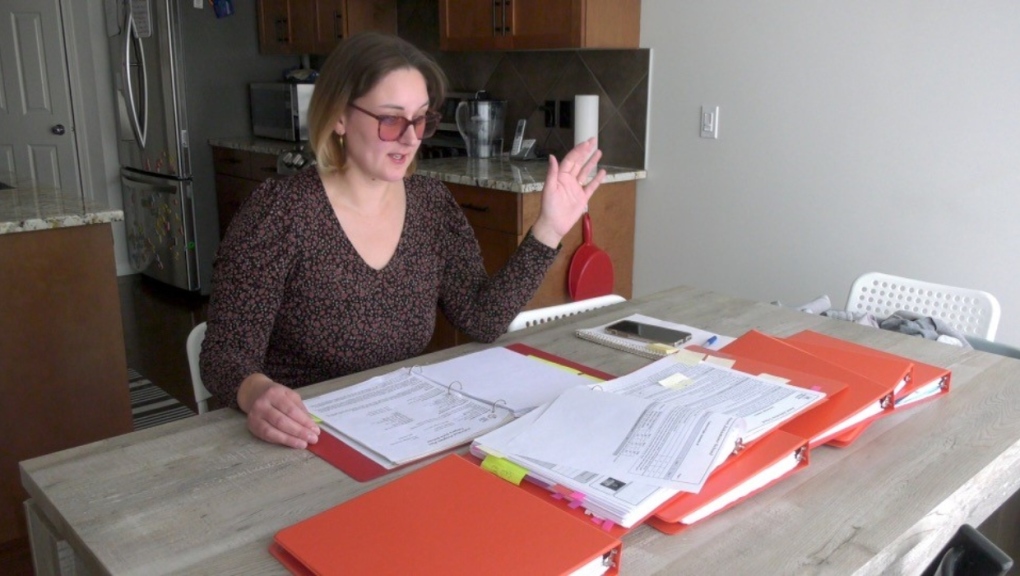Three moms who have kids with special needs say they feel let down by the Calgary Board of Education (CBE).
Melissa Huff has given up her job to stay at home and teach her 13-year-old daughter Brooklyn, because the CBE told her it can’t.
“We are constantly stressed out about finances and being able to make ends meet, but the education of my child is everything for me,” she told CTV News.
 Melissa Huff has given up her job to stay at home and teach her 13-year-old daughter Brooklyn. (Supplied) Brooklyn has an intellectual disability and attention-deficit/hyperactivity disorder (ADHD), along with epilepsy.
Melissa Huff has given up her job to stay at home and teach her 13-year-old daughter Brooklyn. (Supplied) Brooklyn has an intellectual disability and attention-deficit/hyperactivity disorder (ADHD), along with epilepsy.
She is in Grade 8, but functions at a Grade 1 or 2 level, especially in math and science.
Brooklyn was given an Individualized Program Plan (IPP) in kindergarten, but Huff says that was thrown out the window when she got older.
“Once we hit junior high, it was like everybody just gave up on her because they didn’t see her having a big future,” Huff said.
Huff tried to get her daughter into two CBE programs for special needs students, but says she was told Brooklyn didn’t qualify.
“It sort of became them saying to me, ‘We’re not sure what program to put her in, we’re not sure how to help her. What can you do at home for her? What are you able to teach her? ‘”
So, Huff pulled her out and began homeschooling.
 Melissa Huff has given up her job to stay at home and teach her 13-year-old daughter Brooklyn. (Supplied) “There was at that point zero support on what she was learning. It was completely up to me,” she said. “I would think by 2023, we would be in a completely different situation, that we would actually have education for everybody, that there would be more systems in place to help children.”
Melissa Huff has given up her job to stay at home and teach her 13-year-old daughter Brooklyn. (Supplied) “There was at that point zero support on what she was learning. It was completely up to me,” she said. “I would think by 2023, we would be in a completely different situation, that we would actually have education for everybody, that there would be more systems in place to help children.”
Huff says she has constantly advocated for her child’s education, asking teachers and principals for more support and even taking her concerns all the way to Alberta’s premiere.
“The messages I receive back are, ‘We’ll get back to you,’ or ‘Thank you for sharing your concerns,’ but then nobody ever does anything,” she said.
Brooklyn’s situation isn’t isolated.
 Anna Pena Egle says her 13-year-old daughter Izabella struggled in the classroom for years. (Supplied) Anna Pena Egle says her 13-year-old daughter Izabella struggled in the classroom for years.
Anna Pena Egle says her 13-year-old daughter Izabella struggled in the classroom for years. (Supplied) Anna Pena Egle says her 13-year-old daughter Izabella struggled in the classroom for years.
It wasn’t until she and her husband paid out of pocket to get her assessed that they discovered she has ADHD and autism.
“(Izabella) was spending more time at school with her teachers than I was spending with her, and if the experts don’t know or don’t see it and flag it, then how are we supposed to?” Egle’s pen questioned.
Pena Egle transferred Izabella from a CBE school to a chartered school further away, hoping she would get more support, but she hasn’t.
“I have no faith in the school system anymore,” she said.
“It’s just been so long of all these different things that she’s not really getting much out of it and nobody really knows how to help.”
So, Pena Egle just recently decided to pull her out and re-enrol her in the CBE school.
She says the CBE told her she can’t transfer Izabella part-way through the year from another school division, so now she has to wait until the fall.
Pena Egle, who has two other young kids, worries about what the remainder of the school year will look like.
“I can’t be their therapist, their teacher and their mom. It just doesn’t work,” she said.
“That’s why we’re supposed to have schools that know what they’re doing.”
Brandy Winsor, another Calgary mom, has a nine-year-old son with autism, ADHD, Tourette’s Syndrome, dyslexia and dysgraphia, who goes to a CBE school.
At first, she had her son in a traditional school setting and says when she had special support, like an aid, she was able to succeed.
“He was able to be in the school environment. He had friends, he was happy and things were great,” said Winsor.
“But, when the school tried to enforce things, or take a universal approach and strategy, and not listen to our home team, not listen to us, it went sideways. He would clear out the classrooms, he would get into altercations and have huge problems.”
Winsor says there seems to be a lack of understanding about neurodiversity at schools like her son’s.
“He was made to feel like a problem rather than working with him,” she said.
Winsor says she moved him to another school so he could take part in The Bridges program offered by the CBE, which supports students with severe externalizing behaviors, such as physical aggression.
“Now, we’re running into issues where we have more behavior because when you plunk 10 kids’ behavior into a classroom, you can imagine what’s going to happen,” she said.
Winsor says she wants the CBE to be more inclusive for kids with special needs.
“They don’t need to get put into specialized programming and tucked away in the corner… Many of them can be so successful in schools with support. That’s all they need.”
CBE RESPONDS TO CRITICISM
The Calgary Board of Education says it welcomes all students, regardless of their background or abilities.
“We work closely with families to determine the appropriate level of support and programming for their child,” CBE said in a statement.
“School principals work to balance complexity and the range of student needs in classes in a way that will optimize the experience for all students within available resources.”
The CBE encourages any family with concerns about their child’s education to speak with their teacher or principal.
CONCERNS ABOUT FUNDING
Autism Calgary says many other parents also feel like their kids are falling through the cracks of the education system.
“We need to align the funding for special education to students with special needs so that it isn’t filling in other holes in the system,” said Lyndon Parakin, executive director of Autism Calgary.
“It is becoming an issue of ‘pay now or pay later.’ You know, we want students to be optimal, most independent and capable of contributing to our community.”
The Ministry of Education says it has given school boards $1.4 billion to help with specialized learning this school year, an amount set to increase by $100 million in the recent budget.
“Our government is committed to ensuring that equal opportunities are provided for learners in Alberta, which is why we continue to provide critical funding,” the Ministry of Education said in a statement.
It says school boards will find out soon exactly how much they will receive to make sure the special needs students get the help they require.